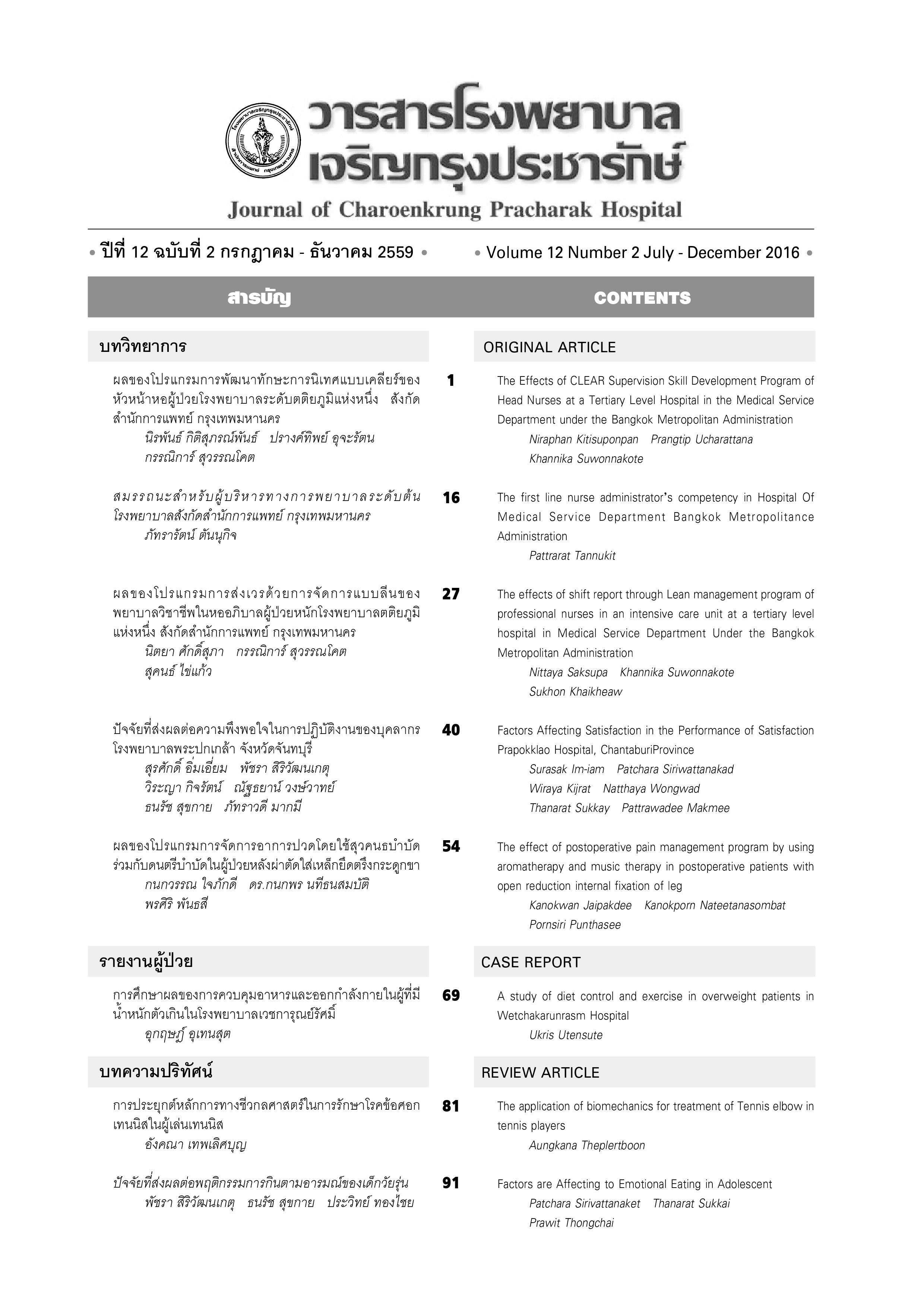ปัจจัยที่ส่งผลต่อพฤติกรรมการกินตามอารมณ์ของเด็กวัยรุ่น
Main Article Content
บทคัดย่อ
บทนำ: วัยรุ่นเป็นวัยหัวเลี้ยวหัวต่อและสุ่มเสี่ยงต่อการรับมือกับความเครียด ด้วยการสร้างพฤติกรรมการกินที่ผิดปกติ หรือที่เรียกว่า การกินตามอารมณ์ ซึ่งเป็นการกินที่ตอบสนองต่อผลกระทบทางอารมณ์ทั้งด้านลบและด้านบวกได้แม้ไม่รู้สึกหิว ถ้าปล่อยให้เป็นในระยะเวลานานจนเข้าสู่วัยผู้ใหญ่และวัยสูงอายุ จะส่งผลให้เกิดโรคอ้วน โรคเรื้อรังต่างๆ ได้ ดังนั้น ถ้าวัยรุ่นมีความรู้และเจตคติที่ถูกต้องเกี่ยวกับการรับประทานอาหารที่ถูกต้อง เหมาะสมแล้ว ก็จะนำไปสู่การปรับพฤติกรรม และเกิดการพัฒนาการทางด้านร่างกาย จิตใจ อารมณ์ สติปัญญาและสุขภาพอนามัยได้อย่างสมบูรณ์
วัตถุประสงค์: เพื่ออธิบายปัจจัยต่างๆ ที่มีผลต่อพฤติกรรมการกินตามอารมณ์ในเด็กวัยรุ่น
วิธีดำเนินการศึกษา: การสังเคราะห์องค์ความรู้จากหลักฐานเชิงประจักษ์ในเรื่องนี้ใช้วิธีการของWhittemore & Knafl
ผลการศึกษา: พบว่าการกินตามอารมณ์ เป็นการกินที่ตอบสนองต่อผลกระทบทางอารมณ์ ทั้งด้านลบและด้านบวก ซึ่งมีความสัมพันธ์กับค่าดัชนีมวลกาย แต่ไม่จำเป็นต้องสัมพันธ์กับปริมาณอาหาร และปัจจัยของพฤติกรรมการกินตามอารมณ์ ได้แก่ 1) ปัจจัยด้านความรู้ ทัศนคติเกี่ยวกับการกิน 2) ปัจจัยด้านอารมณ์3) ปัจจัยด้านผลกระทบของเหตุการณ์ในชีวิตในทางลบ 4) ปัจจัยทางการควบคุมตนเอง และ 5) ปัจจัยการอบรมเลี้ยงดูของผู้ปกครองและพฤติกรรมการกินตามอารมณ์ของครอบครัว
สรุป: พฤติกรรมการกินตามอารมณ์ ซึ่งเป็นพฤติกรรมการกินที่ตอบสนองต่ออารมณ์ของวัยรุ่น ทั้งด้านลบ และด้านบวก เป็นการกินที่ผิดปกติ ถ้าไม่ได้รับการรักษาหรือดูแลอย่างถูกต้อง จะส่งผลให้มีปัญหาต่อสุขภาพในระยะยาว และเสี่ยงต่อการเกิดโรคเรื้อรัง
คำสำคัญ: อารมณ์ องค์ประกอบของอารมณ์ พฤติกรรมการกิน พฤติกรรมการกินตามอารมณ์ วัยรุ่น
Article Details
เอกสารอ้างอิง
2. พัชราภรณ์ อารีย์, สุภารัตน์ วังศรีคูณ, ศรีพรรณ กันธวัง. ภาวะโภชนาการ พฤติกรรมการบริโภคอาหารและกิจกรรมด้านร่างกายของเด็กวัยรุ่น: การศึกษาเบื้องต้น. พยาบาลสาร 2550; 34(2): 98-105.
3. Erikson E. Childhood and society. New York: Norton; 1994.
4. Whittemore R, Knafl K. The integrative review: Updated methodology. J Adv Nurs. 2005; 52(5): 546-53.
5. Von Ah D,†Kang DH,†Carpenter JS. Stress, optimism, and social support: impact on immune responses in breast cancer. Res Nurs Health 2007; 30: 72-83.
6. Timmerman GM, Acton GJ. The relationship between basic need satisfaction and emotional eating. Ment Health Nurs 2001; 22(7): 691-701.
7. Santrock JW. Emotional development.2003. Available from www.slideshare.net/.../ santrockdev-psychchpt-10keynote-7.simon. Retrieved February 13, 2015.
8. Duffy KG, Krish SJ, Atwater E. Psychology for living: adjustment, growth, and behavior today. 10thed. New York: Prentice Hall; 2011.
9. อารยา ปิยะกุล. จิตวิทยาในลีลาชีวิตยุคใหม่ (Psychology in modern life styles). 2551. เข้าถึงได้จาก: www.edu.msu.ac.th/rungson/teach/document/0023016/pdf/04.pdf. เข้าถึงเมื่อ 13ก.พ. 2558.
10. Carlson EA. A prospective longitudinal study of attachment disorganization/disorientation. Child Dev 1998; 69: 1107-28.
11. Garaulet M,†G?mez-Abellán P,†Alburquerque-Béjar JJ,†Lee YC,†Ordovás JM,†Scheer FA. Timing of food intake predicts weight loss effectiveness. Int J Obes (Lond) 2013; 37(4): 604-11.
12. Bonnie Meekums, IevaVaverniece,†IndraMajore-Dusele,†OskarsRasnacs.†Dance movement therapy for obese women with emotional eating: A controlled pilot study. Arts Psychother 2012; 39(2): 126-33.
13. Haycraft E,†Farrow C,†Blissett J. Maternal symptoms of depression are related to observations of controlling feeding practices in mothers of young children. J Fam Psychol 2013; 27(1): 159-64.
14. Patel KA, Schlundt DG. Impact of moods and social context on eatingbehavior. Appetite 2001; 36: 111.
15. Klump KL,†Keel PK,†Racine SE,†Burt SA,†Neale M,†Sisk CL,†et al. The interactive effects of estrogen and progesterone on changes in emotional eating across the menstrual cycle. J Abnorm Psychol 2013; 122(1): 131-7.
16. อาภาภรณ์ พึ่งยอด, ปราโมทย์ สุคนิชย์. ความชุกของทัศนคติและพฤติกรรมการกินที่ผิดปกติในนักเรียนหญิงชั้นมัธยมศึกษาในกรุงเทพมหานคร. วารสารสมาคมจิตแพทย์แห่งประเทศไทย 2554; 56(2): 149-58.
17. อนุกูล พลศิริ. ความรู้ ทัศนคติ และพฤติกรรมการบริโภคอาหารของนักศึกษามหาวิทยาลัยรามคำแหง.วารสารวิจัยรามคำแหง 2551; 11(1): 49-60.
18. Wardle J, Sanderson S, Guthrie CA, Rapoport L, Plomin R. Parental feeding style and the inter-generational transmission of obesity risk. Obes Res 2002; 10(6): 453-62.
19. Benton D, Jarvis M. The role of breakfast and a mid-morning snack on the ability of children to concentrate at school. Physiol Behav 2007;
90: 382-5.
20. Macht M, Haupt C, Salewsky A.Emotions and eating in everyday life: application of the experience-sampling method. Ecol Food Nutr 2004; 43: 327-37.
21. Laitinen J, Ek E, Sovio U. Stress-related eating and drinking behavior and body mass index and predictors of this behavior. Prev Med 2002; 34(1): 29-39.
22. Fleck L. Genesis and development of a scientific fact. Chicago: University of Chicago Press; 1981.
23. Goossens L,†Braet C,†Decaluw? V. Loss of control over eating in obese youngsters. Behav Res Ther 2007; 45: 1-9.
24. Tan CC, Holub SC. Childrenûs self-regulation in eating: associations with inhibitory control and parentsû feeding behavior. J Pediatr Psychol 2011; 36(3): 340-5.
25. Pearson N, Biddle SJ, Gorely T. Family correlates of breakfast consumption among children and adolescents. A systematic review. Appetite 2009; 52(1): 1-7.
26. Birch LL, Fisher JA. Appetite and eating behavior in children. Pediatr Clin North Am 1995; 42: 931-53.
27. Stefan N, Kantartzis K, MachannJ, Schick F, Thamer C, Rittig K, et al. Identification and characterization of metabolically benign obesity in humans. Arch Intern Med 2008; 168(15): 1609-16.


